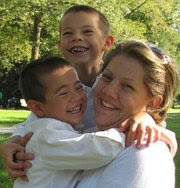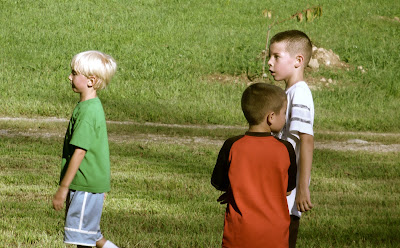Many fear that children who are home schooled will not be "socialized". The short answer is that home schooled children, generally speaking, are socialized just like everyone else. The difference is that they are often socialized in ways that are not deemed normal.
What does it mean to be socialized?
According to the popular information website Wikipedia,
"{socialization} is a term used by sociologists, social psychologists, anthropologists, political scientists and educationalists to refer to the process of inheriting and disseminating norms, customs and ideologies. It may provide the individual with the skills and habits necessary for participating within their own society; a society develops a culture through a plurality of shared norms, customs, values, traditions, social roles, symbols and languages. Socialization is thus ‘the means by which social and cultural continuity are attained".
When looking at this definition in light of school children, how does it play out? In contrast, how should it appear when viewed through the eyes of scripture. Socialism provides individuals with skills and habits necessary... The society develops culture through shared norms, customs, values, social roles, symbols and languages...
A visit to the local library this afternoon just as school was letting out gave me yet another sad, but clear glimpse at youth culture. Students at the library, speaking disrespectfully to the librarians, rudely causing a raucous at the circulation desk, foolishly running through the stacks, giggling loudly and disruptively.
Many, many children who had just walked from school flooded the library. Sadly, it seemed none of them knew how to behave in a library. If they did know, they disregarded any prior instruction they may have had. They had no care or concern for others, except those they were "socializing" with.
The herd mentality reigned.
Having been a librarian in the past, I know well the frustration of flipping the switch from librarian to nanny when the school bell rings, to disciplinarian as things inevitably get out of hand. The students huddle together, whisper and comment, laugh about the trouble they cause. They are socialized, I guess you would say, in that they're fitting in with their culture, their society. They have conformed. They were seeking approval from none other than their peers.
The herd mentality reigned.
Having been a librarian in the past, I know well the frustration of flipping the switch from librarian to nanny when the school bell rings, to disciplinarian as things inevitably get out of hand. The students huddle together, whisper and comment, laugh about the trouble they cause. They are socialized, I guess you would say, in that they're fitting in with their culture, their society. They have conformed. They were seeking approval from none other than their peers.
When looking through a Biblical lens, the skills children should obtain should be ones that will benefit them and others. They should be skills that help them to minister to others, or to one day support a family. The habits they should have should be Godly. They should be trained to show respect for authority. By the teen years, they should be moving into adulthood, and be displaying evidence of the transition from childhood to adulthood in their discipline and self-control.
A stark contrast to today's standard of extended adolescence!
A stark contrast to today's standard of extended adolescence!
What about shared norms? Social norms are unwritten rules about how to behave and behavior that fulfills them is conformity. Take a stroll through a local shopping mall and you'll find that youth travel in packs, nearly always with the same clothing and hair styles as those with whom they travel. Those from whom they seek approval.
What is this socialization that requires a uniform?
Conformity, as opposed to individuality?
They think of themselves as leaders, yet their behavior displays their lack of leadership.
What about values? Foolishness seems a value among many youth today, but scripture speaks plainly about the perils of foolishness. If popular music and movies are a reflection of the language youth speak, I am certain the language of youth is not God-honoring.
Contrary to popular belief, the opposite of the above is not necessarily life in a monastery.
Homeschooled children interact with many different kinds of people on a daily basis. The difference is that they do not spend their days segregated according to age and/or academic ability. They learn that there is little good to be had in a quantity of acquaintances, but much to be had in quality relationships. Their days are not filled with loud lunch rooms and quiet classrooms, but are spent living life, and experiencing the world, outside of a man made institution.
On a personal and practical note, our children do stay home a lot.
When they're home the parent/child and sibling relationships are fostered. That said, they do get out plenty!
They visit local businesses often. They do field trips often. They participate in extra curricular activities from time to time when we find they will be beneficial for the family as a whole, as well as for the child participating. They have, in the past, been part of a homeschool group and have recently joined a new co-op (a weekly meeting with 62 children from 22 families ages infant through high school in which parents are the teachers). They attend church and Sunday School. They do play dates. They spend days at a time with their grandparents.
When they're home the parent/child and sibling relationships are fostered. That said, they do get out plenty!
They visit local businesses often. They do field trips often. They participate in extra curricular activities from time to time when we find they will be beneficial for the family as a whole, as well as for the child participating. They have, in the past, been part of a homeschool group and have recently joined a new co-op (a weekly meeting with 62 children from 22 families ages infant through high school in which parents are the teachers). They attend church and Sunday School. They do play dates. They spend days at a time with their grandparents.
In the settings they are in, they are being trained and, I guess you could say, socialized. There are many instances where what they are taught at home is tested, but we know where they are at all times. We know who they are with. We know what movies they're watching, what music they're listening to and what they're viewing online. We know what they're reading, and what and who is influencing them.
Children require training.
Training must be diligent.
It must be wholehearted.
It must be consistent.
Do not be deceived: “Bad company ruins good morals." 1 Corinthians 15:33
Do not be deceived: “Bad company ruins good morals." 1 Corinthians 15:33












No comments:
Post a Comment